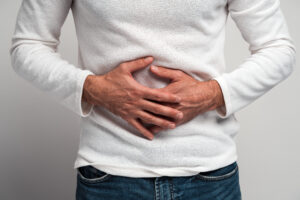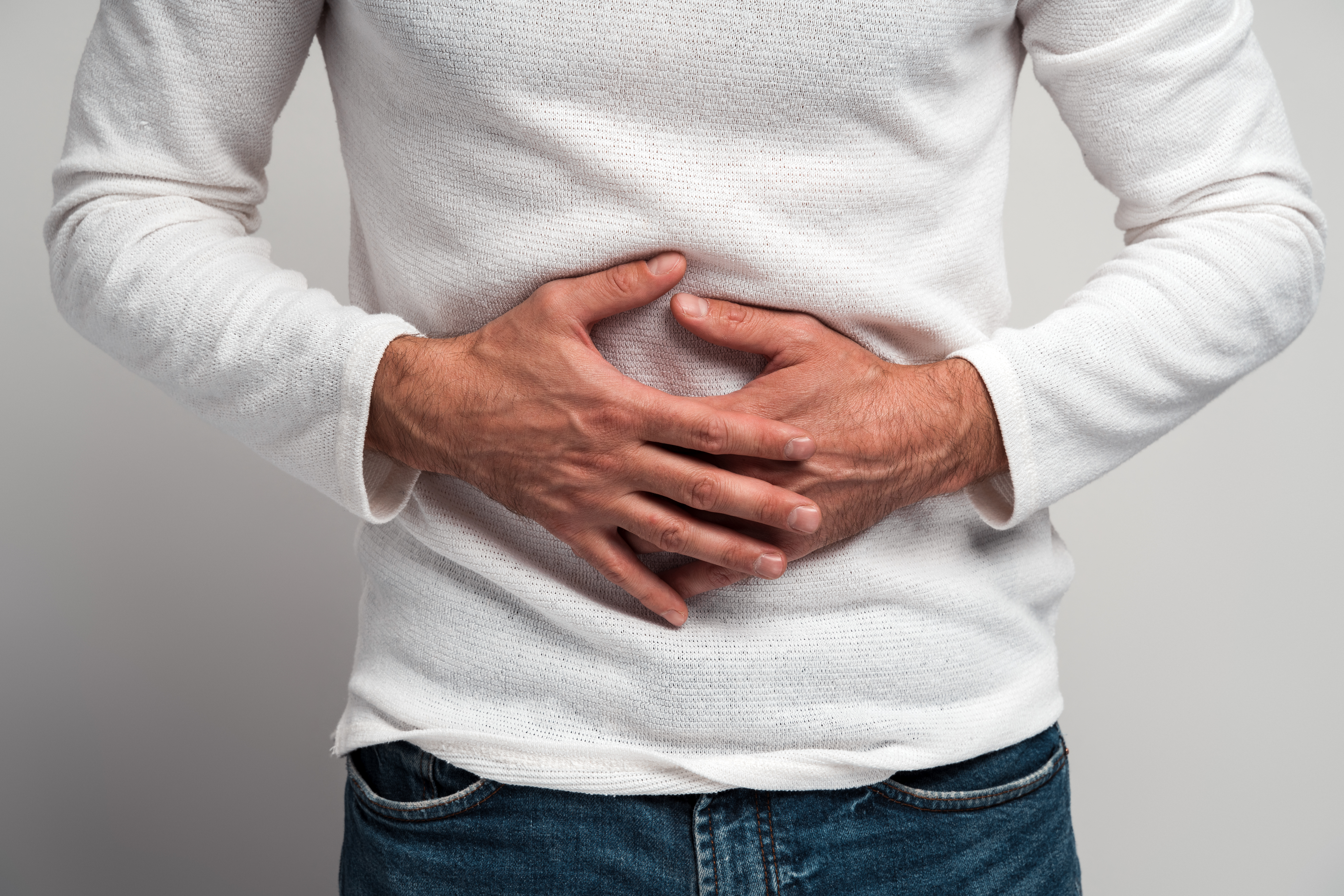Written by Taylor Woosley, Science Writer. Learn about the symptoms and causes of SIBO as well as natural treatments that will help support a thriving digestive system.
 Small Intestinal Bacterial Overgrowth (SIBO) occurs when there is an abnormal growth of bacteria in the small intestine, leading to digestive problems1. Typically, the small intestine has fewer bacteria than the large intestine, but when this balance is disrupted, SIBO can develop, significantly affecting one’s quality of life.
Small Intestinal Bacterial Overgrowth (SIBO) occurs when there is an abnormal growth of bacteria in the small intestine, leading to digestive problems1. Typically, the small intestine has fewer bacteria than the large intestine, but when this balance is disrupted, SIBO can develop, significantly affecting one’s quality of life.
The development of SIBO can be attributed to several factors, including an imbalance in gut microbiota due to conditions like IBS, diabetes, or previous gastrointestinal surgeries2. Low stomach acid levels or impaired gut motility can also create an environment conducive to bacterial overgrowth3. Certain medications, particularly antibiotics, can further disrupt the natural balance of gut bacteria. When the movement of food and waste through the intestines is hindered, bacteria can proliferate in the small intestine, causing an imbalance.
A balanced gut microbiome is vital for overall health, aiding digestion, supporting the immune system, and synthesizing essential nutrients.
Symptoms and Causes of SIBO
SIBO can manifest through various symptoms, making early recognition crucial. Common symptoms include bloating, abdominal pain, diarrhea, constipation, and excessive gas4. Some individuals may also experience fatigue, unintended weight loss, and nutritional deficiencies due to malabsorption.
Diet and lifestyle play a key role in managing SIBO. A diet high in refined carbohydrates and sugars can promote bacterial growth, worsening symptoms. Conversely, a balanced diet rich in whole foods and fiber may support gut health and reduce SIBO risk5. Lifestyle factors such as stress, lack of exercise, and poor sleep can also influence gut health, making a holistic approach to well-being essential.
Diagnosis of SIBO
Diagnosing SIBO typically involves clinical evaluation and specific tests. Breath tests, which measure hydrogen and methane levels in the breath after consuming a sugar solution, are commonly used for detection. An increase in these gases suggests an abnormal presence of bacteria in the small intestine, confirming SIBO. There are currently four subtypes of SIBO: hydrogen-dominant, methane-dominant, hydrogen/methane-dominant6 and hydrogen/sulfide dominant7.
Breath tests are favored for their non-invasive nature and quick results. Patients usually fast before the test to ensure accurate measurements. If you experience symptoms like bloating, diarrhea, or abdominal pain, discussing SIBO with a healthcare provider is advisable.
Supplements That May Help Reduce SIBO
While prescription antibiotics like rifaximin or herbal antimicrobials are standard treatments, certain supplements can support treatment and may help reduce SIBO.
Natural antimicrobials can target bacterial overgrowth, including:
- Berberine is a natural alkaloid with evidence showcasing its ability to ameliorate intestinal inflammation in humans and enhance the composition of beneficial bacteria8.
- Oregano oil, rich in antioxidants, has been shown to increase the expression of tight junctions, which improves intestinal barrier activity, along with causing a reduction in proinflammatory cytokines9.
- Garlic is revered for its potent bioactive compounds, such as allicin, with research suggesting it aids in improving the mucosal barrier, blocking proinflammatory cytokines, and modulating gut microbiota10.
Incorporating these natural substances into your wellness routine may offer a holistic approach to maintaining good health. These are often used in rotations to prevent resistance, typically for 4–6 weeks. It is important to consult with a healthcare professional before making significant changes to your diet or supplementation routine.
Digestive Support for SIBO
Barrier support:
- Glutamine is a non-essential amino acid that has been shown to promote the expression of some proteins in tight junctions, leading to strengthened barrier function and reduced gut permeability11.
To improve motility and digestion, consider:
- Digestive enzymes play an important role in the regulation of the intestinal microbiota and help break down food, reducing fermentation by bacteria12.
- Betaine HCl may improve stomach acid levels if low, helping kill unwanted bacteria (use under guidance)13.
Prokinetics
To help move food and bacteria through the small intestine:
- Ginger and its active constituents have been reported to enhance gastrointestinal motility and gastric emptying, along with improving gastrointestinal symptoms14.
- Triphala is an Ayurvedic herbal formula consisting of three plants with data indicating that its robust polyphenol content aids in modulating the gut microbiota by promoting the growth of beneficial bacteria and inhibiting the growth of undesirable bacteria15.
Binder
To absorb and help remove bacterial toxins:
- Bentonite clay has been shown to act as a detoxifying agent, as well as aiding in nutrient absorption through its ability to increase gut flora activity16.
Long-Term Outlook for SIBO Management
Effective management of SIBO often begins with dietary changes that alleviate symptoms and support gut health. Identifying foods that promote, or hinder recovery is crucial. Generally, include foods low in fermentable carbohydrates, like lean proteins, non-starchy vegetables, and healthy fats. Avoid high-FODMAP foods, such as certain grains, legumes, dairy products, and sweeteners like agave syrup, as they can exacerbate symptoms.
Untreated SIBO can lead to significant complications, including nutrient malabsorption, weight loss, and chronic digestive issues. Over time, SIBO may contribute to more severe conditions like irritable bowel syndrome (IBS) and leaky gut syndrome.
Consistent gut health maintenance is crucial for those who have experienced SIBO. Regular use of gut-supporting supplements, combined with lifestyle adjustments, helps promotes a thriving digestive system. Regular check-ins with a healthcare professional can help tailor a maintenance plan that suits individual needs.
Posted October 3, 2025.
Taylor Woosley studied biology at Purdue University before becoming a 2016 graduate of Columbia College Chicago with a major in Writing. She currently resides in Glen Ellyn, IL.
References:
- Skrzydło-Radomańska B, Cukrowska B. How to Recognize and Treat Small Intestinal Bacterial Overgrowth? Journal of clinical medicine. Oct 12 2022;11(20)doi:10.3390/jcm11206017
- Bushyhead D, Quigley EMM. Small Intestinal Bacterial Overgrowth-Pathophysiology and Its Implications for Definition and Management. Gastroenterology. Sep 2022;163(3):593–607. doi:10.1053/j.gastro.2022.04.002
- Efremova I, Maslennikov R, Poluektova E, et al. Epidemiology of small intestinal bacterial overgrowth. World J Gastroenterol. Jun 14 2023;29(22):3400–3421. doi:10.3748/wjg.v29.i22.3400
- Sellge G, Ockenga J. Bakterielle Fehlbesiedlung des Dünndarms (SIBO)–Therapie, Ernährung, Mikrobiom. DMW-Deutsche Medizinische Wochenschrift. 2024;149(18):1071–1079.
- Wielgosz-Grochowska JP, Domanski N, Drywień ME. Efficacy of an Irritable Bowel Syndrome Diet in the Treatment of Small Intestinal Bacterial Overgrowth: A Narrative Review. Nutrients. Aug 17 2022;14(16)doi:10.3390/nu14163382
- Wielgosz-Grochowska JP, Domanski N, Drywień ME. Identification of SIBO Subtypes along with Nutritional Status and Diet as Key Elements of SIBO Therapy. Int J Mol Sci. Jul 4 2024;25(13)doi:10.3390/ijms25137341
- Moreno García A, Grimalt Oliver M, González-Moreno J, Ribot-Sansó MA, Cisneros-Barroso E, Losada López I. Small intestinal bacterial overgrowth in variant transthyretin amyloidosis (A-ATTRv). Orphanet J Rare Dis. May 2 2025;20(1):210. doi:10.1186/s13023-025-03727-y
- Guo H, Lu S, Zhang J, et al. Berberine and rifaximin effects on small intestinal bacterial overgrowth: Study protocol for an investigator-initiated, double-arm, open-label, randomized clinical trial (BRIEF-SIBO study). Front Pharmacol. 2023;14:1121435. doi:10.3389/fphar.2023.1121435
- Camarda L, Mattioli LB, Corazza I, Marzetti C, Budriesi R. Targeting the Gut-Brain Axis with Plant-Derived Essential Oils: Phytocannabinoids and Beyond. Nutrients. May 3 2025;17(9)doi:10.3390/nu17091578
- Shao X, Sun C, Tang X, et al. Anti-Inflammatory and Intestinal Microbiota Modulation Properties of Jinxiang Garlic (Allium sativum L.) Polysaccharides toward Dextran Sodium Sulfate-Induced Colitis. J Agric Food Chem. Nov 4 2020;68(44):12295–12309. doi:10.1021/acs.jafc.0c04773
- Abbasi F, Haghighat Lari MM, Khosravi GR, Mansouri E, Payandeh N, Milajerdi A. A systematic review and meta-analysis of clinical trials on the effects of glutamine supplementation on gut permeability in adults. Amino Acids. Oct 13 2024;56(1):60. doi:10.1007/s00726-024-03420-7
- Jiang Z, Mei L, Li Y, et al. Enzymatic Regulation of the Gut Microbiota: Mechanisms and Implications for Host Health. Biomolecules. Dec 20 2024;14(12)doi:10.3390/biom14121638
- Guilliams TG, Drake LE. Meal-Time Supplementation with Betaine HCl for Functional Hypochlorhydria: What is the Evidence? Integr Med (Encinitas). Feb 2020;19(1):32–36.
- Hu M-L, Rayner CK, Wu K-L, et al. Effect of ginger on gastric motility and symptoms of functional dyspepsia. World J Gastroenterol. 2011;17(1):105–10.
- Tarasiuk A, Mosińska P, Fichna J. Triphala: current applications and new perspectives on the treatment of functional gastrointestinal disorders. Chin Med. 2018;13:39. doi:10.1186/s13020-018-0197-6
- Moosavi M. Bentonite Clay as a Natural Remedy: A Brief Review. Iran J Public Health. Sep 2017;46(9):1176–1183.







Comments (0)